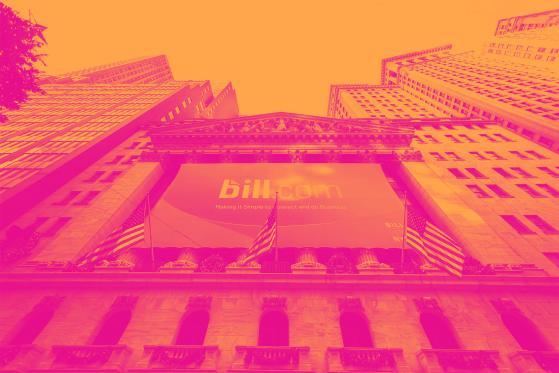What Happened: Shares of payments and billing software maker Bill.com (NYSE:BILL) jumped 5.8% in the morning session, reflecting the broader market's ongoing uptrend, which some may playfully call the Santa Claus rally (a real observed phenomenon where the market tends to drift upwards during the holiday season for reasons such as optimism and year-end tax considerations for funds and investors). All major indices rose, fueled by growing optimism about the Federal Reserve not only concluding its rate hikes but cutting in 2024. Easing inflation has been the catalyst for this change in tone from the Fed.
During the December 2023 Fed meeting, committee members signaled for at least three quarter-point rate cuts in 2024, roughly aligning with market expectations but more accommodative than Fed officials' previous statements. This has set the stage for a soft landing scenario, where inflation comes under control without damage to the economy that could hurt overall consumer demand.
As a reminder, lower rates are good for stock valuations, especially for tech companies where the market needs to discount back cash flows further out in the future. When the math is done to discount these cash flows back to today, a lower assumed discount rate leads to higher present values.
Is now the time to buy Bill.com? Find out by reading the original article on StockStory.
What is the market telling us: Bill.com's shares are very volatile and over the last year have had 37 moves greater than 5%. In context of that, today's move is indicating the market considers this news meaningful but not something that would fundamentally change its perception of the business.
The biggest move we wrote about over the last year was about 2 months ago, when the stock dropped 34.1% on the news that the company slashed full-year revenue guidance, which will result in Wall Street analysts reducing their estimates. As a reminder, stocks follow the direction of Wall Street's financial estimates, so it is no surprise that the stock was down on this news. Similarly, revenue guidance for the next quarter also came in below Consensus. Lastly, gross and free cash flow margins were down.
Management attributed the weak results to tough economic conditions, citing increased uncertainty as it primarily serves small businesses struggling to adapt to current realities. These challenges have led to a noticeable decrease in spending. Starting in late fiscal Q1 and extending into Q2, the company observed customers and suppliers tightening their belts. Additionally, it noted that larger suppliers are opting for lower-cost payment methods, even if it means slower payments. Management expects the trend to persist and could negatively impact the company's transaction monetization in the short term.
The market hates uncertainty, and this commentary (when paired with the slashed full year guidance) do not at all inspire confidence in the near to medium-term prospects for the business.
Following the results, KeyBanc downgraded the stock to Sector Weight (Neutral) from Overweight (Buy). The firm said "We are downgrading Bill.com to Sector Weight as we see headwinds from macro factors (e.g., tighter spend, changing payment preference, prudent approach to credit) and worsened sentiment surrounding SMB spend as unlikely to subside in the NT. We continue to view Bill.com as a LT category winner with a solid management team in place, though see a lack of catalysts for shares at this juncture."
Bill.com is down 25.4% since the beginning of the year, and at $81.43 per share it is trading 39.9% below its 52-week high of $135.52 from July 2023. Investors who bought $1,000 worth of Bill.com's shares at the IPO in December 2019 would now be looking at an investment worth $2,295.
